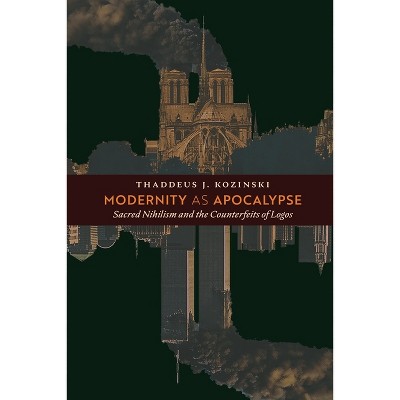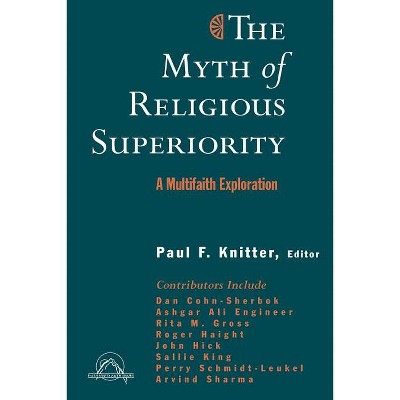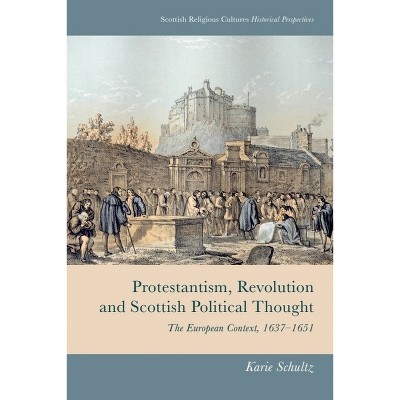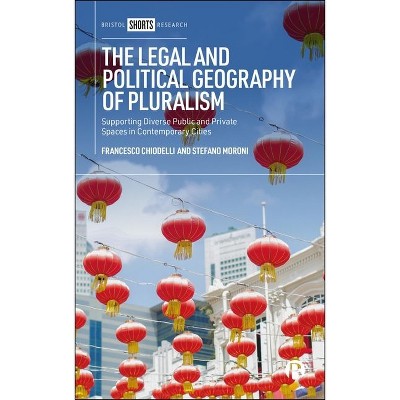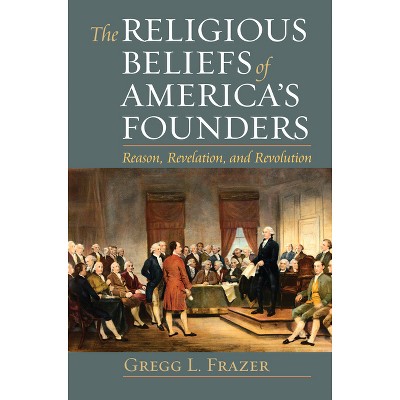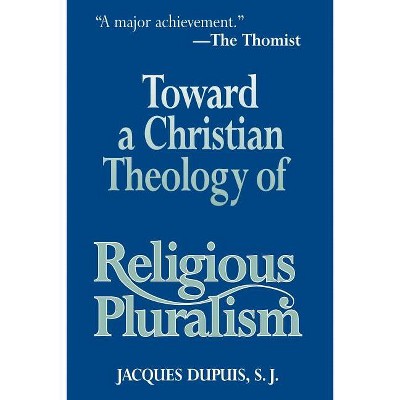Sponsored

Political Problem of Religious Pluralism - by Thaddeus J Kozinski (Paperback)
$57.99
In Stock
Eligible for registries and wish lists
Sponsored
About this item
Highlights
- This book examines three notable philosophers' attempts to solve the political problem of religious pluralism: John Rawls, Jacques Maritain, and Alasdair MacIntyre.
- About the Author: Thaddeus J. Kozinski is assistant professor of humanities and philosophy at Wyoming Catholic College.
- 290 Pages
- Philosophy, Ethics & Moral Philosophy
Description
About the Book
This book examines three notable philosophers' attempts to solve the political problem of religious pluralism: John Rawls, Jacques Maritain, and Alasdair MacIntyre. Although many philosophers have grappled with this problem, what has not been sufficiently explored is the recip...Book Synopsis
This book examines three notable philosophers' attempts to solve the political problem of religious pluralism: John Rawls, Jacques Maritain, and Alasdair MacIntyre. Although many philosophers have grappled with this problem, what has not been sufficiently explored is the reciprocal relationship of foundational belief to political theory and political theory to political practice. Kozinski, using thorough research and a high level of philosophical discourse, deals with these issues directly and astutely demonstrates how any solution that does not incorporate both political philosophy and political theology is doomed to fail.Review Quotes
A sophisticated, cumulative case for the moral limitations and metaphysical bankruptcy of liberal political philosophy--even in its Catholic (Maritainian) form. Drawing on the much-discussed MacIntyre but going beyond him, the author shows why civil society, and the State, need a sacral keystone to complete the arch of a comprehensive human good. My only disappointment is that the book ended so soon, before displaying what a humane theopolitically legitimated State might look like: I await with eagerness a sequel where the author will do justice to his constructive as well as analytic gifts.
Dr. Kozinski's work is a masterful exposition of three of the most important political philosophers of the twentieth century. His two chapters on each form an excellent introduction for the novice political philosopher as well as a detailed critique of each of them for the expert. Having searched out the core principles of each, Dr. Kozinski finds them all wanting in different respects....Upon a thorough reading of Dr. Kozinski's book, the conclusion that a system committed to deep pluralism on principle, like contemporary America, is not a true commonwealth is inescapable. Yet, he holds open the hope that it could become one. In doing so he sets an agenda for much philosophical work to be done.
For anyone seeking insight into the deeper philosophical issues of our present political conundrum, The Political Problem of Religious Pluralism - And Why Philosophers Can't Solve It is a worthy book that deserves a careful reading.
In this rigorously argued book, Thaddeus Kozinski suggests that critiques of liberalism must find their resolution in the idea of a confessional state. Those of us who disagree will be forced to offer equally rigorous defenses of a Christian politics that is neither liberal nor state-centered. Any contemporary vision of a theological politics must take this book's stimulating and provocative argument into account.
In this work Thaddeus Kozinski tackles the prickly problem of religious pluralism. ... [T]his [is] an immensely important work that challenges the dominant religious and secular positions on how we ought to understand and deal politically with religious pluralism. It raises a number of important questions, foremost among them how Christians ought to understand and operate within contemporary political structures where there is no neutrality. It also develops a sophisticated critique of the supposed compatibility of the Christian tradition with liberal political theory. Finally, it convincingly shows that we cannot avoid taking a position on theological questions when developing political theories and policy.
Kozinski presents a penetrating and interesting analysis of three philosophers who address the political problem of living in a religiously pluralist society. This book comes out of a doctoral thesis and has the marks of close extensive reading, careful engagement with secondary texts, and the beginnings of the most interesting alternative position which necessarily remains underdeveloped.
Kozinski's book is a substantial and interesting piece of work, and it raises important questions in an engaging way. There is much to be learned from it, and from reflection about it.
Thaddeus Kozinski belongs to a new generation of Catholic scholars for whom the social consensus of the 1950s is something known only from oral history and old movies, and the Catholic social theory formulated within that context is woefully inadequate to meet the challenges of the twenty-first century. This work brings the theories of John Rawls, Jacques Maritain and Alasdair MacIntyre into dialog and reaches the conclusion that there are problems within the realm of political theory that cannot be solved philosophically--solutions need to be found elsewhere. Kozinski's book is on the cutting edge of a new generation of Catholic political theory and will be valuable for students of political theory everywhere regardless of their theological backgrounds.
What Kozinski does provide concretely to his reader is an appreciation that politics is inseparable from theology. Political ideals and practices are premised upon beliefs in metaphysical truths, even as the existence of such truths might be denied. He notes that liberalism is as much a religion as Catholicism. With his incisive understanding of the strengths and weaknesses of liberalism and Thomistic Catholicism as intellectual traditions, he succeeds in his primary objective of setting the groundwork for the type of dialogue he advocates--one guided by a regulative idea of truth knowable to its participants.
About the Author
Thaddeus J. Kozinski is assistant professor of humanities and philosophy at Wyoming Catholic College.Dimensions (Overall): 8.9 Inches (H) x 5.9 Inches (W) x .9 Inches (D)
Weight: .95 Pounds
Suggested Age: 22 Years and Up
Number of Pages: 290
Genre: Philosophy
Sub-Genre: Ethics & Moral Philosophy
Publisher: Lexington Books
Format: Paperback
Author: Thaddeus J Kozinski
Language: English
Street Date: December 23, 2012
TCIN: 1004175693
UPC: 9780739179871
Item Number (DPCI): 247-28-6394
Origin: Made in the USA or Imported
If the item details aren’t accurate or complete, we want to know about it.
Shipping details
Estimated ship dimensions: 0.9 inches length x 5.9 inches width x 8.9 inches height
Estimated ship weight: 0.95 pounds
We regret that this item cannot be shipped to PO Boxes.
This item cannot be shipped to the following locations: American Samoa (see also separate entry under AS), Guam (see also separate entry under GU), Northern Mariana Islands, Puerto Rico (see also separate entry under PR), United States Minor Outlying Islands, Virgin Islands, U.S., APO/FPO
Return details
This item can be returned to any Target store or Target.com.
This item must be returned within 90 days of the date it was purchased in store, shipped, delivered by a Shipt shopper, or made ready for pickup.
See the return policy for complete information.
Trending Philosophy

$13.99 - $23.05
MSRP $25.00 - $40.00
Buy 2, get 1 free select books
4.4 out of 5 stars with 197 ratings

$15.00
MSRP $25.00
Buy 2, get 1 free select books
4.5 out of 5 stars with 4 ratings

$10.78
Buy 2, get 1 free select books
4.6 out of 5 stars with 22 ratings

$8.18
MSRP $11.00
Buy 2, get 1 free select books
4.8 out of 5 stars with 5 ratings

$12.69
MSRP $22.99
Buy 2, get 1 free select books
5 out of 5 stars with 1 ratings

$7.26
MSRP $12.00
Buy 2, get 1 free select books
4 out of 5 stars with 2 ratings
